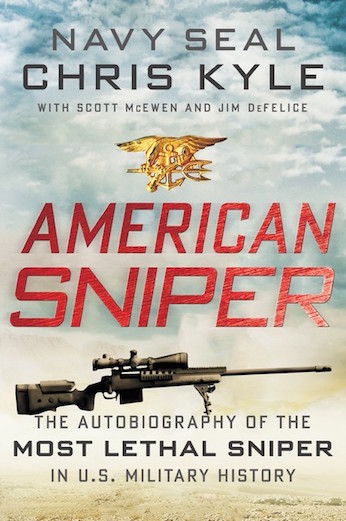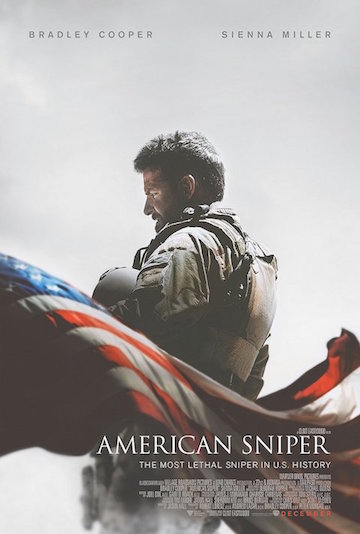
A couple weeks ago before I heard about the hoopla surrounding what right-wing or left-wing people were saying about the movie “American Sniper,” I picked up and read Chris Kyle’s 2012 book of it because I was curious to get a glimpse of the war in Iraq from a Navy SEAL’s first-hand account. My brother had given the book to my husband for Christmas and it was lying around. I didn’t know much about it other than it seemed like a scary-ass war book from its title, the movie trailers, and the fact that Chris Kyle is credited with the most sniper kills in U.S. military history.
Indeed the book is scary and disturbing as war is. I’m sure no one can fully comprehend the reality or horrors of war who haven’t experienced it as our troops have. Chris Kyle’s account is quite blunt and candid. He tells of how he became a Navy SEAL and about his four tours in Iraq from 2003 to 2009. He takes readers along the way through the intense urban combat he experienced in the Iraqi cities of Fallujah, Ramadi, and Sadr City. Mostly Kyle was responsible for sniper overwatches, where he and his team set up in or on top of buildings, protecting Marines or Army troops on the ground by shooting anyone who posed them harm. He also did foot patrols with troops and went door-to-door, weeding out insurgents and weapons caches.
It’s heart-pounding warfare not for the squeamish. Kyle was shooting to kill each time and makes no bones about it in the book. He was doing his job, he says, before the enemy killed him or other troops. He was so good at being a sniper that the insurgents labeled him the “devil of Ramadi” and put a bounty on his head, while U.S troops referred to him as “the Legend.” He placed his priorities in God, country, and family in that order (despite his wife’s disagreement). And his moral clarity about protecting his Team by killing enemies never wavers in the book. He has no regrets about his service other than he couldn’t save more U.S. troops, or trade places with the three U.S. Navy SEALS who lost their lives during his time there.
I’m sure Kyle saved very many lives in the line of fire. He served four tours in Iraq in incredibly dangerous conditions, while at the same time missing out on his family when his kids were babies. I commend him and the troops for their service to the country and Allied mission. He says in the book he wasn’t doing it for the Iraqi people, who he doesn’t seem to put much faith in, but solely for the U.S. He doesn’t go into why we were in Iraq in the first place but simply went where elected officials declared war.
Kyle’s view is definitely a patriotic account but is it, as some say, propaganda? I think he lets readers decide what they will. Quite a few will find the book like I did disturbing in his love of war and killing — how he was concerned with the numbers and in getting the most kills, and how he refers at some points to the Iraqis as savages and details mowing down the “bad guys’” and delighting in their slaughter. It takes a toll just reading about it, much less doing it. Though I’m sure we need tough guys like Kyle to wage our dangerous battles and protect the country.
Apparently the latest edition of the book has been toned down a bit. Though candidly opinionated by Kyle, the book at this point has been vetted by the military, two co-authors, and lawyers alike. Such scenes as in the movie’s trailer that shows a mother and son moving toward the U.S. troops with an RKG grenade was redacted from the book says the movie’s screenwriter. Gone, too, is the subchapter apparently in which Kyle wrote about punching out Jesse Ventura, which Ventura said never happened and in which he won a $1.8 million defamation lawsuit against Kyle.
Despite that, Kyle’s account is informative in bringing insight into how the troops worked in Iraq, into weapons, rank, tactics, what the landscape and war was like, what factions they faced, what SEALS are like, and what they did. The book also highlights how hard deployments are on military families and returning veterans. It shows the war abroad as well as the war at home, where spouses often raise children on their own and vets can’t get the help they need. Kyle’s wife, Taya, writes passages throughout the book about what she’s experiencing and the relations between her and Kyle.
At one point, it seemed the stress of warfare would break their marriage apart, but the book relates how with great effort they held on. By the end, with his wife’s urging, Kyle leaves the war and eventually begins a security company (Craft Intl) and starts helping veterans return to civilian life. The war changed Kyle; it undoubtedly took a toll and affected him. He seems to grow from it by the book’s end. Tragically Chris Kyle was killed in 2013 while helping a vet at a Texas gun range. Now the murder trial of him is all over the news.

It’s prominent especially because the movie of “American Sniper” has been such an astounding blockbuster. I saw it on Sunday and would never have thought that it would become the top war movie of all time at the box office, nor the top movie of 2014, which it looks like it will be. The movie is effective and moving, rough to watch in parts, and in places powerful, but I wouldn’t pick it as the best war film ever.
It’s drawn controversy no doubt. Those on the right say it’s patriotic, heroic, and highlights the hardships of military families and vets, and also shows the toll the war took on Kyle. While some on the left see the movie as glorifying an unjust war, violence, and a gun culture run amok. Take your pick. I feel it’s more the former than the latter. It’s up for six Academy Awards. I’m still a bit puzzled by the huge success of it when other Iraq war films haven’t fared well.
The film differs from the book quite a bit, notably the movie has the U.S. troops trying to root out a couple of specific Iraqi bad guys, whereas the book describes the clearing out of insurgents in general. Other details differ as well and the script was revised after Kyle was killed. His wife Taya and their marriage troubles figure in both the book and movie. Bradley Cooper who plays Kyle and Sienna Miller who plays Taya excel in their roles. Cooper looks much huskier, and purposely bulked up for the part. I heard about the “fake baby” the filmmakers used in a scene and had to laugh a bit when it came up despite the scene’s seriousness. A rubber baby? C’mon Clint.
The book and movie I’m sure aren’t for everyone. For me I think it’s always informative to know what the country’s military is up to, or what is being asked of our troops, or to reflect on what has been done. I’m curious sometimes to read various perspectives, both military and non-military, about the conflicts in Afghanistan and Iraq, even though they can be a harsh look at human existence. This particular story seems to have its lessons: about sacrifice, about family, and about showing that war is hell and should be the very last resort.
What about you — do you have any interest in seeing the movie or reading the book? And if you have, what did you think?

I’m tempted — as you were — just because of all the buzz this book/movie is generating, but I’m thinking I will pass. Just too much for me. After reading The Narrow Road to the Deep North about WWII Japanese prisoners of war, then The Bone Clocks with its dystopian ending, then Just Mercy about Capital punishment in the U.S. and now The Body Keeps the Score about Trauma victims, I’m beginning to feel a little traumatized by my reading. I’ll keep Leroy Jethro Gibbs as my favorite sniper.
Yeah Barbara, you sound like you need a break from more trauma reading. Pick up something lighter.
I have qualms about the movie or the book…I am opposed to most wars, although that is not a popular opinion nowadays.
My own perspective is colored by the return of warriors, like my nephew, suffering from PTSD…and dying because of it.
So…no, not so much interested in this movie, but I usually enjoy Bradley Cooper and Sienna Miller.
Here are MY WEEKLY UPDATES
Yeah Bradley and Sienna do well in their roles. I understand your view of war Laurel.
I know a lot of people I know have raved about this movie but I’m just not interested in it or the book. I know war is a reality but I like to keep my head in the sand.
I find myself curious about our troops being sent overseas etc. I feel for them. Thanks for stopping by Kathy
I feel mixed on both of these. On the one hand, I think learning more about what our troops go through while serving the country is really important. And intellectually, I get that the role of a sniper is very important and part of those dangerous missions. But I can’t quite get myself to a place where the killing should be glorified or celebrated, and so I think I’d struggle with that part of the book and the movie.
Yeah I understand the struggle Kim. The book is disturbing in parts. War is hard to hear about no doubt
I’m pleased I saw the film and agree this is a difficult subject. But we should step out a little and go see what interest others occassionally, even if not us personally. Take a Flyer. Anything we can do to reduce red/blue polarization and step out a little. Having said that, still puzzled how this is even considered best war film ever. Not even close. (disclaimer—related to blogger)
Thanks Robert. Though it’s just the best-selling war movie at the box office which doesnt mean it’s considered the best war flick.
I AM interested in reading this book and maybe eventually seeing the movie. But I want to read the original book and I don’t know if that one is available anymore.
It disappoints me, but doesn’t surprise me, to see all the conflict over this story.
Yeah Darlene, I wonder if the original book is available — maybe it’s at a second hand store. It must be a doozy. He apparently didn’t shy away from fights and that part about Jesse Ventura is a bit hard to figure out. Thanks for stopping by